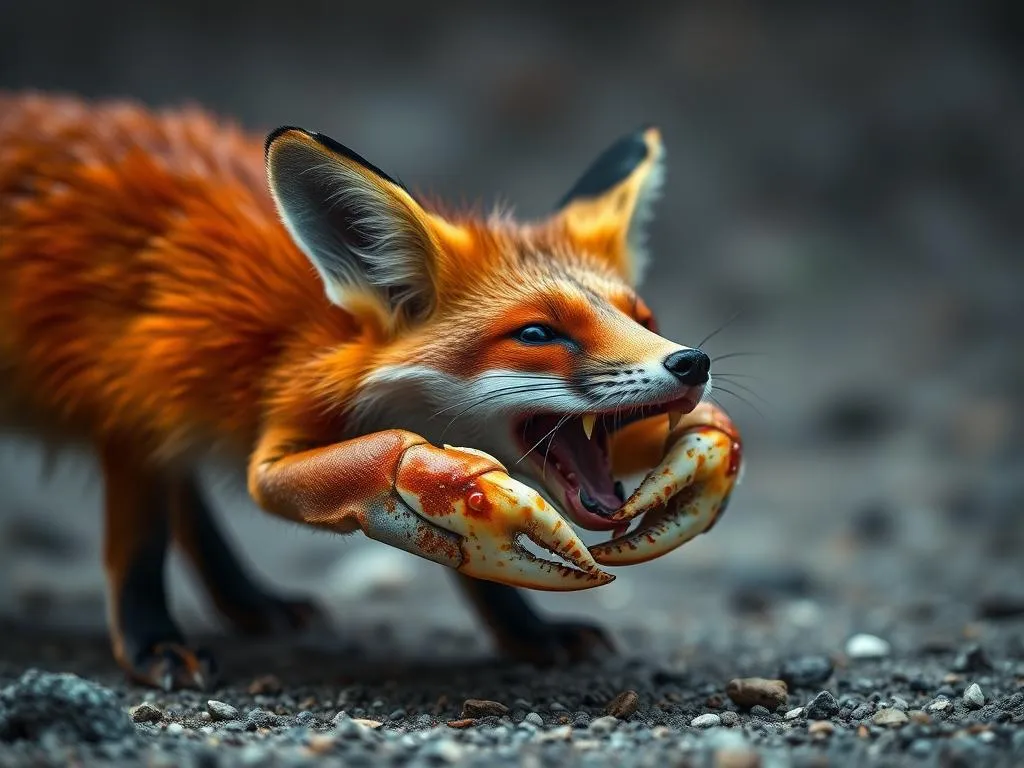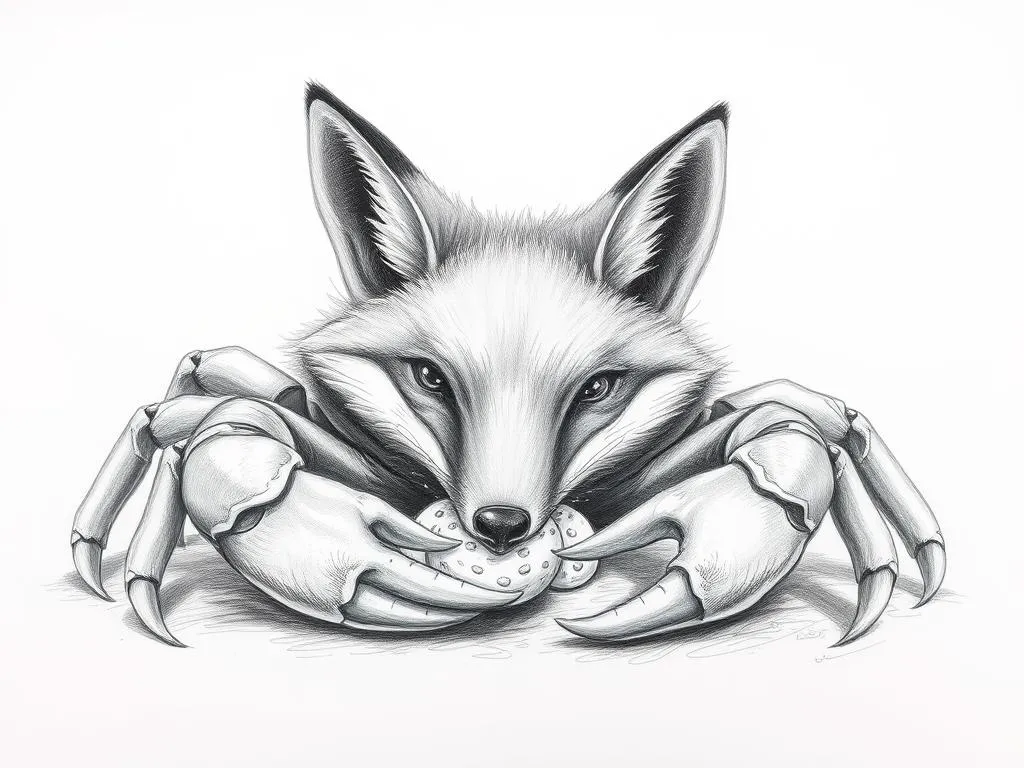The Enigmatic Crab-Eating Fox: Symbolism and Significance

Disclaimer: Some images on this website are AI-generated artworks and may not accurately represent real animals.
The crab-eating fox, scientifically known as Cerdocyon thous, is a fascinating species that captures the imagination of many. Not only does this animal have unique physical and behavioral traits, but it also holds significant symbolism and meaning in various cultures. In this blog post, we will delve into the world of the crab-eating fox, exploring its taxonomy, habitat, physical characteristics, and behavior, while also examining the deeper meanings associated with this remarkable creature.
Understanding the Crab-Eating Fox
Taxonomy and Habitat
The crab-eating fox belongs to the Canidae family, which includes dogs, wolves, and other foxes. As a member of the genus Cerdocyon, it is closely related to other small canids. This species is primarily found in South America, with its range extending from the northern regions of Brazil to parts of Argentina, Paraguay, and Uruguay.
In terms of habitat, the crab-eating fox thrives in a variety of environments. It prefers areas near water sources, such as rivers and marshes, and can often be found in tropical savannas, grasslands, and even coastal regions. This adaptability to different habitats is a hallmark of its survival strategy.
Physical Characteristics
The crab-eating fox boasts several distinctive physical traits that set it apart from other canids. Below is a summary of its key characteristics:
| Feature | Description |
|---|---|
| Size | Medium-sized, typically weighing 5-10 kg |
| Coloration | Fur is predominantly grayish-brown with lighter underparts |
| Unique Features | Long legs and a slender body; bushy tail; pointed ears |
This combination of features allows the crab-eating fox to navigate diverse terrains efficiently.
Behavioral Traits
The behavior of the crab-eating fox is as intriguing as its physical traits.
Diet and Feeding Habits
As its name suggests, this fox has a varied diet that includes crustaceans like crabs, but it is not limited to them. It also consumes small mammals, birds, fruits, and insects. This omnivorous diet showcases the fox’s flexibility in food choices, allowing it to thrive in different environments.
Social Structure and Communication
The crab-eating fox is generally solitary or found in small family groups. They communicate through a range of vocalizations, including barks and howls, as well as through scent markings. This social behavior enhances their ability to establish territories and find mates.

Symbolism & Spiritual Meaning
The crab-eating fox is rich in symbolism and holds various meanings across cultures.
Cunning and Adaptability
One of the most prominent symbols associated with the crab-eating fox is cunning. Its ability to adapt to varying environments and diets is a testament to its cleverness. This adaptability serves as a reminder that survival often requires resourcefulness and intelligence.
In many cultures, the fox represents a trickster figure, showcasing the importance of wit in overcoming obstacles. Just like the crab-eating fox, individuals can learn to navigate life’s challenges through clever strategies and adaptability.
Balance of Nature
The crab-eating fox plays a crucial role in its ecosystem. As both a predator and prey, it contributes to maintaining a natural balance. Its hunting of crustaceans and small mammals helps regulate these populations, while its presence supports the food chain.
Symbolically, the crab-eating fox represents the balance of nature. It reminds us of the interconnectedness of all living things and the importance of maintaining ecological harmony. This balance is essential for a healthy environment, emphasizing the need for conservation efforts.
Resourcefulness
Another significant aspect of the crab-eating fox’s symbolism is resourcefulness. By utilizing available resources in its environment, this fox teaches us valuable lessons about making the most of what we have.
In a world where we often seek more, the crab-eating fox inspires us to appreciate the abundance around us. Its ability to thrive in various habitats serves as a metaphor for resilience and ingenuity, encouraging individuals to harness their skills and talents effectively.
The Crab-Eating Fox in Dreams
Common Dream Themes
Dreaming of the crab-eating fox can evoke a range of interpretations. Common themes include:
- Cunning Solutions: The fox may symbolize a need to find clever solutions to problems.
- Adaptability: Dreams featuring the fox may indicate a situation requiring flexibility and quick thinking.
- Resourcefulness: Such dreams may suggest that the dreamer should utilize available resources more effectively.
Messages from the Subconscious
The appearance of the crab-eating fox in dreams can also carry messages from the subconscious. It may signify a call to adapt to changes in one’s waking life or to tap into inner strengths that may have been overlooked.
This connection to adaptability and resourcefulness reflects the qualities of the crab-eating fox, encouraging individuals to draw upon these traits to navigate challenges.
Cultural Interpretations
Different cultures have unique interpretations of the symbolism of the crab-eating fox in dreams.
| Culture | Interpretation |
|---|---|
| Indigenous Cultures | Seen as a guide or protector in dreams |
| Western Societies | Represents cunning and adaptability |
| Eastern Traditions | Symbolizes balance and harmony |
These diverse perspectives highlight the multifaceted nature of the crab-eating fox’s symbolism in dreams, emphasizing its relevance across various cultural contexts.
Modern Interpretations
Cultural Significance
In contemporary culture, the crab-eating fox appears in various forms of art, literature, and folklore. It often embodies themes of cleverness and survival, resonating with audiences who appreciate stories of resilience and adaptability.
This representation not only celebrates the animal’s unique traits but also serves as a reminder of the importance of embracing cleverness in our everyday lives.
Environmental Symbol
The crab-eating fox serves as an important environmental symbol. Its presence in diverse ecosystems represents biodiversity and the health of natural habitats. As a species that thrives in various environments, it highlights the need for conservation efforts to protect the delicate balance of ecosystems worldwide.
Personal Growth and Transformation
Individuals can draw inspiration from the crab-eating fox for personal growth and transformation. Its attributes of cunning, adaptability, and resourcefulness can guide individuals in their journeys. By connecting with these traits, people can learn to navigate life’s complexities and embrace change with grace.
Key Takeaways
The crab-eating fox embodies rich symbolism that can be integrated into various aspects of life. Here are some key takeaways:
- Adaptability: Embrace change and be open to new experiences.
- Resourcefulness: Utilize available resources to overcome challenges.
- Balance: Recognize the interconnectedness of all living things and support ecological harmony.
Reflecting on these qualities can inspire personal growth and a deeper connection with the natural world.
Conclusion
The crab-eating fox serves as a powerful symbol of adaptability, resourcefulness, and balance in nature. Its ability to thrive in diverse environments highlights the importance of cleverness in overcoming challenges. By embracing the spirit of the crab-eating fox, individuals can navigate life’s complexities with a keen sense of adaptability and resilience.
In exploring our connections with nature and its symbolism, we find inspiration in the lessons that the crab-eating fox imparts, encouraging us to live with intention and resourcefulness.







